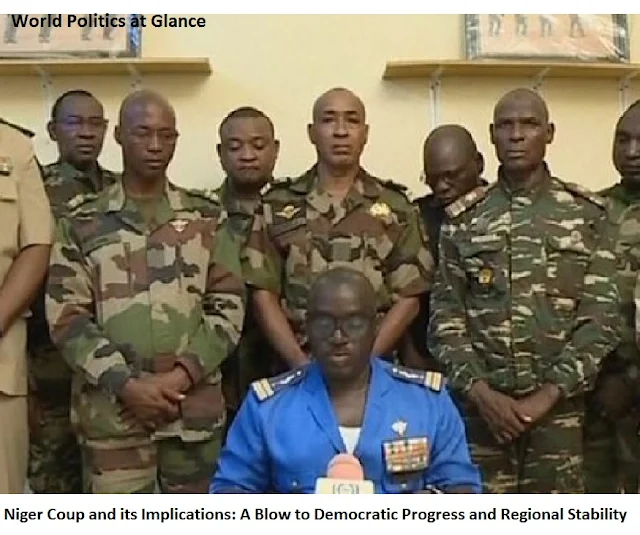 |
| Image Credit: Google |
Niger's Coup and its Implications: A Blow to Democratic Progress and Regional Stability
On Wednesday, elements of Niger’s presidential guard initiated a process that eventually led to the ousting of President Mohamed Bazoum, who had been in office since April 2021.
Army spokesperson Colonel-Major Amadou Abdramane announced on state-run television that the defense and security forces had decided to put an end to the existing regime, citing the deteriorating security situation and perceived mismanagement.
This successful military mutiny marks the fifth coup in West Africa since 2020, reflecting a concerning trend for the region often referred to as the "coup belt."
Emanating Security Concerns
It has significant implications for Niger, which witnessed its first democratic transition of power with Bazoum's election just months earlier.
The coup also raises security concerns for Western nations and hampers regional cooperation in addressing conflicts that have engulfed the Sahel.
The Sahel, consisting of Mali, Niger, Burkina Faso, Chad, and Mauritania, has been affected by the influx of small arms, mercenaries, and armed groups following the NATO-led takedown of Libyan dictator Muammar Gaddafi in 2011.
This influx energized groups like Boko Haram in Nigeria and led to the return of Touareg fighters to Mali with weapons, reigniting a rebellion in the border region shared by Mali, Burkina Faso, and Niger.
Frustration with the handling of security issues and the perceived ineffectiveness of foreign troops, especially French forces in Mali and Burkina Faso, led to changes of leadership and soured relations with Western countries.
Niger was the Beacon of Stability
Niger, previously seen as a beacon of stability in the Sahel, became an important partner for Western nations seeking to protect their interests and prevent African migration to Europe.
However, Niger's partnership with the West came with risks. While Bazoum's predecessor, Mahamadou Issoufou, stepped down after his constitutionally mandated two-term limit to avoid a coup, complaints about governance, corruption, and incompetence within and beyond the military surfaced.
The coup attempt drew widespread condemnation from the international community, with the African Union and the Economic Community of West African States (ECOWAS) rejecting any action that hinders legitimate authority in Niger or the broader West African region.
Uncertainty out of Certain Coup
As Niger's political future remains uncertain, Bazoum remains defiant in protecting the hard-won democratic gains despite his removal from office.
The outcome of negotiations to resolve the situation remains unknown, leaving the country and its Western partners in a state of uncertainty.
The successful mutiny that ousted President Bazoum was not the first time Niger faced an attempted coup.
In March 2021, a military unit tried unsuccessfully to seize the presidential palace just days before Bazoum was due to be sworn in as the newly elected president.
This series of attempted coups indicates underlying political tensions and fragilities within the country.
The Impact of Coup Beyond Borders
The impact of this latest coup stretches beyond Niger's borders, affecting regional security dynamics in the Sahel.
The Sahel region has been grappling with a complex and evolving security crisis since 2012, with various armed groups vying for power and control over vast territories.
The proliferation of violence in the Sahel has been fueled by factors such as poverty, marginalization, weak governance, and the availability of weapons.
The successful military takeover in Niger has broader implications for the West African region, which has experienced several coup attempts in neighboring countries, including Burkina Faso and Mali.
These attempts have been driven by frustration with governance and the inability of ruling governments to address the escalating security challenges.
Furthermore, the coup poses a significant challenge for Western countries involved in counterterrorism efforts in the Sahel.
Niger has been a crucial partner in the fight against extremist groups operating in the region.
Western nations, including the United States and France, have maintained military presence and cooperation with Niger to combat terrorism.
The coup potentially disrupts this security cooperation and complicates efforts to address the growing threat of terrorism in the Sahel.
The ongoing crisis also raises questions about the effectiveness of international engagement in supporting democratic governance and stability in the region.
Despite receiving Western aid and support, Niger faced challenges in addressing economic disparities, corruption, and governance inefficiencies.
This highlights the need for a more comprehensive approach to promoting stability and development in the Sahel beyond solely relying on military interventions.
As the international community continues to condemn the coup and call for a return to democratic governance, the focus remains on finding a peaceful resolution to the crisis.
Regional and international leaders are actively engaged in diplomatic efforts to resolve the situation and restore stability in Niger.
However, the path forward remains uncertain, and the outcome of negotiations will shape the future of Niger and its role in regional security efforts.
In conclusion, the coup in Niger has significant implications for democratic progress and regional stability in the Sahel.
The successful military takeover poses challenges for Niger's political landscape and hampers regional security cooperation.
The broader impact on counterterrorism efforts and Western involvement in the region adds complexity to addressing the escalating security crisis.
As the international community calls for a peaceful resolution and the
restoration of democratic governance, the situation in Niger remains fluid,
requiring continued diplomatic efforts to find a viable solution for the
country and the wider West African region.
(Courtesy: Al-Jazeera)
Post a Comment
0Comments